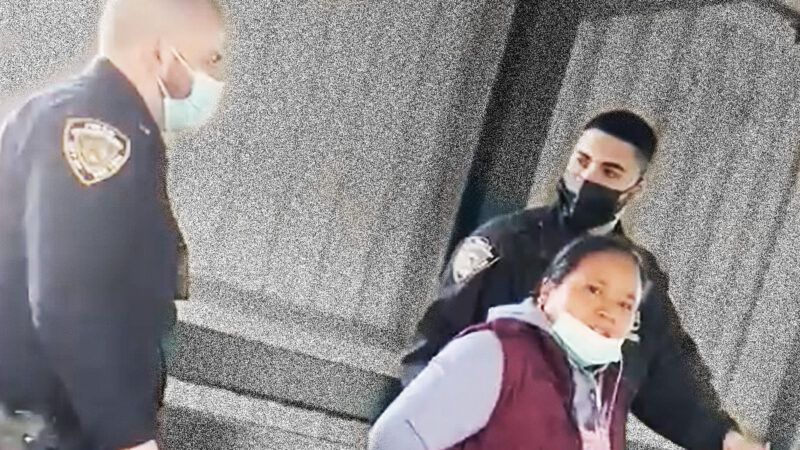NYC Mayor Defends Decision To Handcuff and Strip Search Woman Selling Mangos on a Subway Platform
Maria Falcon doesn't have a business license. So New York police officers detained her and confiscated all of her merchandise.

New York Mayor Eric Adams held a press conference today in which he defended the New York Police Department (NYPD) decision to handcuff, detain, and strip search a criminal who has been contributing to the city's culture of lawlessness and urban decay. Her name is Maria Falcon, and she's guilty of bringing her mango cart to a Brooklyn subway platform.
"Next day is propane tanks being on the subway system. Next day is barbecuing on the subway system," said Adams today. "You just can't do that."
On April 29, Falcon was approached by police, cuffed, and led away to the NYPD Transit District 33 station where officers had her remove her clothes so they could search for weapons and drugs. She was held there for two hours before cops ultimately cited her for the violation of unauthorized commercial activity. They also confiscated all of her products. "I felt very scared and very fearful," she told AM New York.
But, according to Adams, it's the people of New York that should be afraid of her and her ilk—the fruit sellers, the barbecuers, the big, bad George Foreman grillers.
Yet, contra Adams' remarks, this is not a story about the perils of mom and pop vendors selling products people want on the subway and what dangerous descent it might lead to. Falcon wasn't cited because her business is inherently illegal. She was cited because she does not have a business license—something that many small entrepreneurs like herself cannot afford or obtain. The $500 permits are capped, meaning the thousands of people not fortunate enough to receive one are forced to shutter their livelihoods, operate illegally, or attempt to raise the money to lease one from a lucky license recipient at exorbitant rates, an infeasible ask for many.
"The MTA [Metropolitan Transportation Authority] recognizes the benefits that vending can provide, but there are also safety-oriented rules about vending on platforms," said Aaron Donovan, a spokesperson for the agency, in a statement. "While there are a wide range of opinions about which rules to prioritize, the MTA appreciates that the NYPD is working across the board to protect subway riders and encourage compliance with all Rules of Conduct in the system."
Protecting subway riders and New Yorkers at large has been a central promise from Adams, a former police officer with the NYPD. It's a noble goal, particularly as violent crime has risen. Core to his promise was the decision to double the number of officers stationed in the subway system, where the city has seen an uptick in crime. Bolstering the police presence certainly makes sense if the goal is to prevent attacks. It makes decidedly less sense, though, if the result is cops scrolling on their cellphones and strip searching fruit sellers.
In some sense, Falcon's story is a perverse full-circle moment. A woman named Elsa met a similar fate in 2019 for daring to sell churros on the subway platform. She was not the first vendor to be arrested, and Falcon will not be the last, something Adams reminded us of at his conference today.
Elsa was sitting next to Falcon on the day she was arrested—two food sellers detained for circumventing onerous, prohibitive licensing laws that keep people from making a living. I, for one, feel no safer.


Show Comments (87)